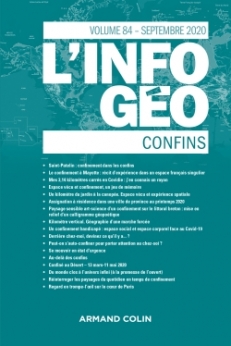
L'information géographique (3/2020)
Pour acheter ce numéro, contactez-nous
Recevez les numéros de l'année en cours et accédez à l'intégralité des articles en ligne.
La période de confinement vécue lors de la crise du Covid-19 en mars, avril et mai 2020 a modifié le rapport que chacun entretient avec « son » espace, notamment du fait du rétrécissement de l’espace vécu. La réduction des possibles n’est cependant pas nécessairement vécue négativement. Si le confort matériel joue un rôle non négligeable, c’est pourtant la diminution importante de sollicitations extérieures qui permet un recentrement sur le chez-soi. La temporalité change avec l’ambiance, permettant et obligeant à plus d’attention à ce qui environne l’individu confiné, permettant aussi un rattrapage de ce qui a été laissé de côté. Ainsi, attention et rattrapage temporel conduisent à une plus grande appropriation de l’espace vécu. Cependant, comment considérer que si le confinement présente des aspects très positifs, nous ne puissions mettre en place une telle situation ?
The period of confinement experienced during the Covid-19 crisis in March, April and May 2020 has changed the relationship that each person has with "his" space, in particular because of the shrinking of living space. However, the reduction of possibilities is not necessarily experienced negatively. If material comfort plays a significant role, it is nevertheless the significant reduction in external demands that allows a refocusing on the home. The temporality changes with the atmosphere, allowing and obliging more attention to what surrounds the confined individual, also allowing a catch-up of what has been left aside. In this way, attention and temporal catch-up lead to a greater appropriation of the lived space. However, how can we consider that if the confinement presents very positive aspects, we cannot set up such a situation ?